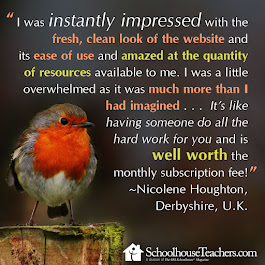This post contains affiliate links - using affiliate links from Homeschool Coffee Break helps fuel this blog and our homeschool - thank you!
No matter how long we've been homeschooling, we are curious about how other homeschoolers do things. And homeschoolers who are newer to the game obviously have lots of questions! This series will try to answers some of the questions homeschoolers ask each other. Questions about how we handle some of the little details and about our opinions on different aspects of homeschooling. Questions that we all might answer differently because what works great in one family might not work at all in another.
What about labs in science? How important is it to do labs?
Well . . . it depends. I feel like I say that a lot. But sometimes that really is the answer. Okay - labs. First, let's define labs. Because some people are talking specifically about biology and doing dissections. And some people are talking about hands-on science in general. Other factors are your child's grade level and individual interests.
Labs (dissections) for Biology
Biology is a required credit or subject during high school in most areas. But is it truly necessary to examine owl pellets or dissect a frog during that course? Unless your homeschool oversight group or your state specifically require labs for high school science, it really isn't necessary. In our case, Biology is a required credit, but labs are not required, only recommended. There's a good reason to recommend labs - it does lend a seriousness to the study, but you can certainly gain a thorough understanding of the subject without having to find a fish to cut open. If your student is headed into a related college major and career, then make every effort to include the labs. But if your student, like all four of mine, is doing Biology mostly because it's a required credit and not because they have a particular interest in it, then labs can be optional. Besides, as we like to say, that's what YouTube is for.
Find out more about the Biology courses we've reviewed and used: Biology Basics

Spencer was able to do a dissection lab class during our short course co-op in his Grade 8 year. We 'banked' the labs and he did a Biology course in Grade 9 and got full credit.

And this is a true story - when Landon was doing Biology in high school, I really had no plans to include labs His best friend was also doing Biology and the friend's mom (a very dear friend of mine) offered to have Landon come over so the boys could do the dissections together. We knew very well that those boys could come up with some nutty ideas together, so she kept a close eye on them as they were working on dissecting a fish or frog or whatever outside. But you know what happened when they were finished and came inside for lunch? The goat showed up and ate Landon's homework.



Okay, back to the questions.
Hands-on Science
In general, I think any time you can get some hands-on activities and experiments included for science, it's a very good thing. It's not required, but I would say it's important. And that goes for all ages, but it's especially true for younger kids. My kids studied geology, ecology, chemistry, physics, mechanics, meteorology, and more when they were young, and doing hands-on work made it fun and memorable. Whether it was making our own soda while studying solutions in chemistry, building and testing catapults and trebuchets during a co-op physics class, or laying out a backyard compass to use for making observations for a classical astronomy course, doing the activity reinforced the knowledge. And made it a lot more fun in most cases!



Find out more about our Classical Astronomy course: Classical Astronomy

To sum up, my opinion is that labs and hands-on science activities may not be required, but they are important. If your high schooler has no plans to be a vet, or if your younger child has an extreme aversion to getting their hands dirty, then the labs and activities may not be worth it; but if you can make it happen and make it fun, it will be a great and worthwhile addition to the textbook!
If you're still looking for a good Science course, SchoolhouseTeachers.com has many to choose from, geared for all ages.

Well . . . it depends. I feel like I say that a lot. But sometimes that really is the answer. Okay - labs. First, let's define labs. Because some people are talking specifically about biology and doing dissections. And some people are talking about hands-on science in general. Other factors are your child's grade level and individual interests.
Labs (dissections) for Biology
Biology is a required credit or subject during high school in most areas. But is it truly necessary to examine owl pellets or dissect a frog during that course? Unless your homeschool oversight group or your state specifically require labs for high school science, it really isn't necessary. In our case, Biology is a required credit, but labs are not required, only recommended. There's a good reason to recommend labs - it does lend a seriousness to the study, but you can certainly gain a thorough understanding of the subject without having to find a fish to cut open. If your student is headed into a related college major and career, then make every effort to include the labs. But if your student, like all four of mine, is doing Biology mostly because it's a required credit and not because they have a particular interest in it, then labs can be optional. Besides, as we like to say, that's what YouTube is for.
Find out more about the Biology courses we've reviewed and used: Biology Basics

Spencer was able to do a dissection lab class during our short course co-op in his Grade 8 year. We 'banked' the labs and he did a Biology course in Grade 9 and got full credit.
And this is a true story - when Landon was doing Biology in high school, I really had no plans to include labs His best friend was also doing Biology and the friend's mom (a very dear friend of mine) offered to have Landon come over so the boys could do the dissections together. We knew very well that those boys could come up with some nutty ideas together, so she kept a close eye on them as they were working on dissecting a fish or frog or whatever outside. But you know what happened when they were finished and came inside for lunch? The goat showed up and ate Landon's homework.



Okay, back to the questions.
Hands-on Science
In general, I think any time you can get some hands-on activities and experiments included for science, it's a very good thing. It's not required, but I would say it's important. And that goes for all ages, but it's especially true for younger kids. My kids studied geology, ecology, chemistry, physics, mechanics, meteorology, and more when they were young, and doing hands-on work made it fun and memorable. Whether it was making our own soda while studying solutions in chemistry, building and testing catapults and trebuchets during a co-op physics class, or laying out a backyard compass to use for making observations for a classical astronomy course, doing the activity reinforced the knowledge. And made it a lot more fun in most cases!

Find out more about our Classical Astronomy course: Classical Astronomy

To sum up, my opinion is that labs and hands-on science activities may not be required, but they are important. If your high schooler has no plans to be a vet, or if your younger child has an extreme aversion to getting their hands dirty, then the labs and activities may not be worth it; but if you can make it happen and make it fun, it will be a great and worthwhile addition to the textbook!
If you're still looking for a good Science course, SchoolhouseTeachers.com has many to choose from, geared for all ages.

How do you include hands-on activities in science? How about dissections? Leave a comment and let me know what works for you - or leave a homeschool question you're curious about.

***************
This post is part of the March 2019 Homeschool Collection on the Homeschool Review Crew blog.
©2006-2019 Homeschool Coffee Break. All rights reserved. All text, photographs, artwork, and other content may not be reproduced or transmitted in any form without the written consent of the author. http://kympossibleblog.blogspot.com/
We are a participant in the Amazon Services LLC Associates Program, an affiliate advertising program designed to provide a means for us to earn fees by linking to Amazon.com and affiliated sites.










































1 comments:
My boys love hands on science learning but they have all made it pretty clear hey do not want to ever do dissections.. having made it through to a Master's degree and never having dissected one single thing I am totally find with that. :)
Post a Comment
I love comments! It's like visiting over a virtual cup of coffee.